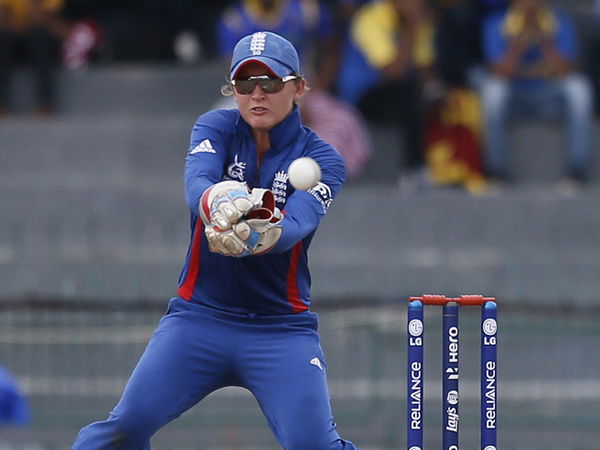
via Imago
Sarah Taylor announced her retirement after dealing with mental health issues in her career.

via Imago
Sarah Taylor announced her retirement after dealing with mental health issues in her career.
Mental illness is one of the illness which many of the people face in their life and cricketers are no less different. Mental health issues include depression, bipolar disorder, self-harm, anxiety, etc. Mental health issues significantly affect many cricketers’ careers. Here are 5 cricketers who have faced mental health issues in their International Cricket career.
1) Marcus Trescothick
The England cricketer, Marcus Trescothick who had announced his retirement in 2006 had faced the mental health issue in his peak of the career. During the tour of India in 2006, he suddenly returned home. Although he had later returned to Test cricket, he revealed he had been dealing with his depression.
ADVERTISEMENT
Article continues below this ad
Having considered the biggest hopes in English cricket, he had to retire at the age of 32 due to depression. He had played 76 Test matches and holds the record for the most ODI centuries of any England player, and also holds the record for the fastest half-century in England’s T20 cricket.

via Imago
Marcus Trescothick
He later admitted in an interview to The Telegraph that he had to take pills to fall asleep and talked about his illness openly. “The depression’s not over. I’m not ‘cured’. I have good days and bad days, but when the bad days come, I feel them coming and I know how to act.”
Trescothick, however, wrote a book about his issues, and now manages his illness quite effectively
2) Jonathan Trott
34-year-old Jonathan Trott is one of those cricketers who faced mental health issues. The top-order batsman who was a part of England’s Ashes squad in 2013 had decided to abruptly end his International career.
At the time, Trott said due to “long-standing stress-related condition” he thought to withdrawal from the test but refused to talk about it further. Even he was not happy when he was asked if he was suffering from depression. He unpleasantly said that he was “not mad”.

via Imago
Jonathan Trott
Although he has retired from all forms of international cricket, he still plays county cricket for Warwickshire. However, while playing county cricket last year, he withdrew due to an ‘anxiety disorder’.
“Just coming down to breakfast, I’d sit on my own away from the guys with my cap over my head because I didn’t know how I was going to react to having to go to the cricket ground again,” he told. “I was waking up looking at the clock hoping the clock had stopped, or that a pylon had fallen on the field and the game had been cancelled, or the stadium had collapsed – as long as there was no one in it, of course. You end up thinking of all sorts of ways you wouldn’t have to go to the ground.” he said to The Independent.
3) Sarah Taylor
England’s wicketkeeper-batter Sarah Taylor also belongs to the list of cricketers who have faced mental health issues in their career. Having made her debut for England in 2006 and has 6,553 international runs in her name, she placed at second on England Women’s all-time list of run-getters.
However, she was more famous for her lightning-quick glove-work behind the stumps. She has 232 dismissals in her name, the most in women’s cricket so far. Taylor played a key role in England’s most memorable victories which included the World T20 win in 2009, and the 50-over World Cup win in 2017. She scored 54 and 45 in England’s semi-final and final victories over South Africa and India respectively.

via Imago
Sarah Taylor
However, constant anxiety issues forced her to announce her retirement that was a bit shocking to the whole world, although it was badly affecting her game in recent years.
”This has been a tough decision but I know it’s the right one, for me and for my health moving forward,” Sarah Taylor said. ”I can’t thank my teammates enough, both past and present, and the ECB for being supporters and friends along my journey. I am extremely proud of my career. I leave with my head held high and with excitement for what my future holds and what my next chapter brings.”
4) Andrew Flintoff
Former England and Lancashire all-rounder, Andrew Flintoff also belongs to the list and he has revealed that he had suffered with depression during the 2006-07 Ashes whitewash in Australia. He even also shared that he was drinking too much during the ICC World Cup in 2007. Flintoff has always been a vital cog for England and never shied about talking the mental health and the depression openly. He has played more than 200 International games where he amassed more than 7000 runs and also took 400 wickets.
While talking to The Guardian, he said, “I didn’t understand what was happening to me. I knew when I got back to my room I couldn’t shut off, which is why I started having a drink. It got to the stage where I was probably drinking more than I should.”

via Imago
Andrew Flintoff
“All I wanted was for the doctor to tell me what was wrong but no one suggested it was depression. There’s a certain sense of shame when I remember sitting in the dressing room after winning a one-day international in the West Indies. The lads were celebrating and I didn’t want to be a part of it, I didn’t want to do anything but sit on my own in the corner,” he shared.
However, later in an interview with the BBC, he shared his condition.
“I’m on medication,” added Flintoff, who used to take anti-depressants. “If I was playing cricket and I had a bad leg, I’d take an anti-inflammatory. If I had a headache, I’d have an aspirin or a paracetamol.”
ADVERTISEMENT
Article continues below this ad
“My head’s no different. If there’s something wrong with me, I’m taking something to help that. And they’re not happy pills, I don’t take a pill and I’m seeing unicorns and rainbows – I just start feeling normal after a few weeks,” he further added.
5) David Bairstow
Former England player David Bairstow also suffered from depression which started with his wife Janet’s illness. He had a heated argument with the cricket officials of Yorkshire. Having played 25 International games, he had scored more than 300 runs and became a popular radio commentator later as well.
ADVERTISEMENT
Article continues below this ad

via Imago
David Bairstow
But there were problems regarding financial and injury-related and also added to it was a drink-driving charge. In late 1997, the former cricketer took an overdose of tablets. Although he survived, after a few weeks he hanged himself at his home due to depression.

